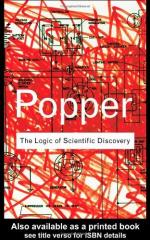
|
| Name: _________________________ | Period: ___________________ |
This test consists of 5 short answer questions, 10 short essay questions, and 1 (of 3) essay topics.
Short Answer Questions
1. What is used to capture and explain the world?
2. What term does Popper use of empirical science?
3. According to Popper, what can't universals be reduced to?
4. What types of statements have no logical justification in which to draw conclusions?
5. What refers to a term that does not need a definition but is learned through experience?
Short Essay Questions
1. Why does Popper view positivism as narrow, limited, and misguided?
2. Why does Popper discredit the conventionalist view of science?
3. Popper states that scientific statements cannot be conclusively disproved. If this is the case what can be determined with these statements?
4. Why is the concept of numerical universality a problem for Popper?
5. What are the two conditions that must be met for a statement to be falsifiable?
6. Why does Popper state that observability is not psychological?
7. What is the task of the logic of scientific discovery?
8. What does Popper classify as being inductive statements?
9. What must an experimenter do in order to test a theory?
10. How does metaphysics factor into the scientific process?
Essay Topics
Write an essay for ONE of the following topics:
Essay Topic 1
Popper suggests that simplicity is used in many senses. Discuss these senses and provide support from the reading. What sense of simplicity does Popper feel is appropriate in science? Do you agree with Popper? Why or why not?
Essay Topic 2
Popper discusses frequency within a finite class. Discuss how this is determined and used in empirical science. Provide examples and support from the reading.
Essay Topic 3
In one experiment designed to somewhat mimic studies by Compton-Simon and Bothe-Geiger, Popper suggests the use of an "imaginary selection." What is the purpose of this selection?
|
This section contains 706 words (approx. 3 pages at 300 words per page) |

|




